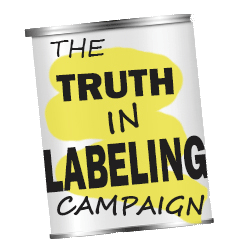At the Truth in Labeling Campaign website there’s a page called “Six Big Fat Lies.” That’s where we revealed what we thought were the favorite propaganda tactics of the glutamate-industry. But we failed to tell you about The Whopper, arguably the biggest, most often repeated and most damaging lie of all.
Unwrapping The Whopper
On April 8, I spoke to Dr. Nancy Turner, Professor and Chair of the Department of Food Science and Human Nutrition at Michigan State University. I had called to ask her how the damage done by Robin Tucker’s statements in MSU’s Serving Up Science: “Umami: The Most Complex Taste” podcast was going to be redressed.
It was following that conversation that the light finally dawned on me. Turner was telling me that humans couldn’t eat enough Manufactured free Glutamic acid (MfG) to cause the brain damage, endocrine disorders, and assorted reactions that the laboratory animals had experienced. That MfG in that quantity wasn’t available. It was then I finally got it. That was the lie that now permeates glutamate-industry propaganda. That was the lie they were using to sell the American public on the notion that MfG is a harmless food additive – and to make money from selling monosodium glutamate, hydrolyzed proteins, autolyzed yeast, maltodextrin, etc.
There will always be Six Big Fat Lies. But all six together can’t hold a candle to the brilliance and the selling power of The Whopper: The lie that we aren’t exposed to enough MfG in processed foods to cause us any harm.
Here’s a little test you can do. Take along a list of the names of ingredients that contain MfG to any store (health-food stores included) and simply read the ingredients listed on the labels of processed foods. I challenge you to find 10 products that don’t contain at least one of the ingredients on that list. And every one of them contains MfG. Think about it. In the course of a day consider how many of those MfG-containing products are in the meals and snacks you enjoy. Include restaurant foods in your tally.
For those who want to get into the science of MfG toxicity consider the following:
An individual’s reaction to MfG depends on both the vulnerability and sensitivity of his or her glutamate receptors. Lack of blood-brain barrier(BBB) development in the unborn (fetus) and the infant make them extremely vulnerable to exposure to MfG passed through their mothers’ diets. Damage done to the BBBs of mature humans through use of drugs, seizures, stroke, trauma to the head, hypoglycemia, hypertension, extreme physical stress, high fever, and the normal process of aging render them more vulnerable than others.
Individual sensitivity may also be related to the integrity of cells or groups of cells that control a particular function. There might well be times when one ingests enough MfG to damage a cell, but not enough to kill it, or damage some of the cells in a group that control a particular function but not enough to knock out all of them. Some MfG-sensitive people report that they can knowingly ingest MfG in a favorite food on one occasion without noticing a reaction, but notice a reaction when that same food is consumed several days in a row.
Reports from consumers tell us that intensity or severity of reactions appear to be affected by alcohol ingestion and/or exercise just prior to, or immediately following MSG ingestion; and some women report variations in their reactions at different times in their menstrual cycles.
The bottom line is that Dr. Turner has no idea whatsoever how much MfG an individual is taking in on a daily basis, nor how sensitive he or she might be at any given time to MfG’s effects. Turner bought into the glutamate-industry line that there isn’t enough MfG available in processed food to cause brain damage and adverse reactions. She’s helping spread The Whopper. And shamefully, she didn’t do the very thing that a Professor in the Department of Food Science and Human Nutrition at Michigan State University must certainly teach her students: “Check it out.”
Be aware. Be informed. Check it out. Don’t buy into The Whopper.
Adrienne



